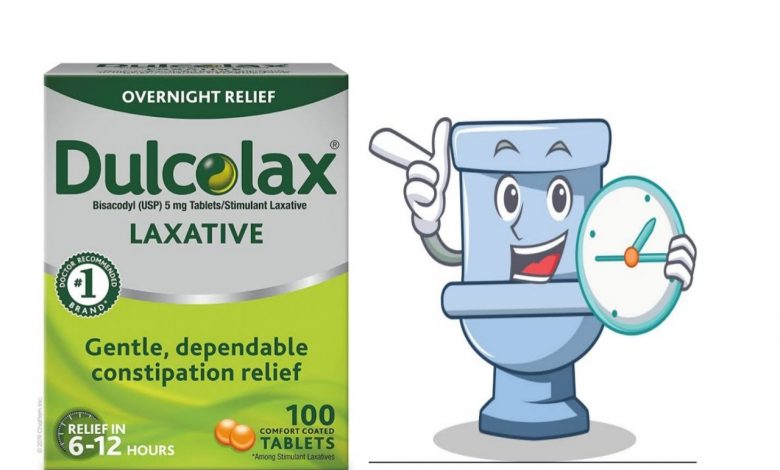How Long Does Dulcolax Last?

Constipation remains one of the most common digestive problems in the United States. Around 16 out of 100 U.S. adults have constipation. This figure doubles for adults over age 60. It’s defined as having hard, dry bowel movements or passing stool fewer than three times a week.
Each person’s bowel habits are different. Some people go three times a day, while others go three times a week.
However, you may be constipated if you experience the following symptoms:
• fewer than three bowel movements a week
• passing lumpy, hard, or dry stools
• straining or pain during bowel movements
• a feeling of fullness, even after having a bowel movement
The National Institute of Diabetes and Digestive and Kidney Diseases (NIDDK) recommends seeking medical advice if symptoms don’t go away or if you notice the following:
• bleeding from the rectum
• blood in your stool
• persistent abdominal pain
• pain in the lower back
• a feeling that gas is trapped
• vomiting
• fever
• unexplained weight loss
• a sudden change in bowel movements
A healthcare professional may carry out tests to rule out a more serious condition, such as colorectal cancer or irritable bowel syndrome (IBS).
What is Dulcolax?
Dulcolax (Bisacodyl) is a medicine used for the treatment of constipation. It’s a laxative, and it helps you empty your bowels. It is often used in hospitals before surgery or some internal examinations or treatments. It works by increasing movement in the intestines. Dulcolax stimulates the muscles in the wall of the small intestine and the colon to stimulate the movement of the intestine. It also alters the levels of water and electrolytes in the intestines, increasing the level of fluids that also produce a laxative effect.
Dulcolax can generally be taken at any time except within 1 hour of consuming dairy products or antacids. They have a special ‘enteric coating’, which protects the tablet from the stomach’s acidic environment and ensures it’s released in the small intestine, where it’s needed most. Discontinue if rectal bleeding or no bowel movement occurs. Do not use if abdominal pain, nausea, or vomiting is present.
Dulcolax® has a variety of products, from laxative tablets and stool softeners to soft chews and suppositories, to put you comfortably in control.
How many tablets can I take?
According to the manufacturer, adults and children over 12 can take 1 to 3 tablets in a single daily dose for up to 7 days. If this is the first time taking a laxative for constipation, we recommend taking 1 to 2 tablets in a single daily dose. Take tablets 30 to 60 minutes before your normal bedtime to produce a bowel movement the next morning. With experience, you may increase your daily dosage to 2 or 3 tablets, if needed. For children less than 12 years of age, refer to the Dulcolax Laxative Drug Facts for dosing information.
How long does Ducolax last?
The effect of Dulcolax suppositories is generally faster than the oral tablets, they produce bowel movements in 15 minutes to 1 hour while the oral tablets produce a bowel movement in 6 to 12 hours. The effects of Dulcolax can last a day or two depending on several factors.
Do not use or take Dulcolax every day for more than 5 days. If you take Dulcolax for longer, your body can start to rely on it, rather than your bowels doing the work on their own. If you are still constipated after 5 days, talk to your doctor.
How long does Dulcolax stay in your system?
There are several factors that come into play when estimating how long Dulcolax will stay in your system because every patient has physiology unique to them. Here are some major factors you should consider when trying to understand how long Dulcolax will stay in your body:
• Age: Typically, the younger you are, the more efficient your body functions are. The more efficient your body functions, the faster Dulcolax will be removed from your system.
• Amount: The higher the dose of Dulcolax you have been taking, the longer Dulcolax will take to be removed from your system.
• Genetics: Genes predispose people to different metabolic functions, which is a key factor in how your body processes medications like Dulcolax, for this reason, your genetic makeup comes into play when estimating how long Dulcolax will remain in your system.
• Kidney and liver functions: The liver and kidneys eliminate everything you ingest, and Dulcolax is no exception. If your liver or kidneys are damaged, it will most likely take longer for your body to remove the Dulcolax from your system.
• Metabolism: Your metabolism determines how quickly you process foods, liquids, and drugs such as Dulcolax. If your metabolism is slow, it will take longer for your body to process and eliminate Dulcolax from its system than for someone with a fast metabolism.
• Usage frequency: The longer you have been taking Dulcolax, the longer it will remain in your system. For example, it will take longer for someone who has taken Dulcolax for several years to remove Dulcolax from the body than someone who has only been taking Dulcolax for a few months.
Dulcolax has a half-life of approximately 16 hours. The half-life of a drug is the time it takes for the amount of a drug’s active substance in your body to reduce by half. About 94 to 97% of a drug will have been eliminated after 4 to 5 half-lives. Thus, it follows that after 4 to 5 half-lives, the plasma concentrations of a given drug will be below a clinically relevant concentration and thus will be considered eliminated. This means that Dulcolax will clear out of a person’s system within 4 days (approximately 80 hours).
What are the side effects of Dulcolax?
Dulcolax tablets
Common side effects include:
• stomach discomfort
• faintness
• cramps
Dulcolax suppository and enema
Common side effects include:
• stomach discomfort
• faintness
• rectal burning
• mild cramps
This is not a complete list of Dulcolax side effects. Ask your doctor or pharmacist for more information.
Tell your doctor if you have any side effect that bothers you or that does not go away.
Call your doctor for medical advice about side effects. You may report side effects to the FDA at 1-800-FDA-1088.
Other Brand Names
Bisacodyl, the active ingredient in Dulcolax may be found in some form under the following brand names: Alophen Reformulated Jan 2008, Bisa-Plex, Bisac-Evac, Bisco-Lax, Bisolax, Carters Little Pills, Correct (New Formula), Correctol, Doxidan Reformulated Sep 2008, Dulcogen, Evac-U-Gen, Ex-lax Ultra, Ez2go Stimu-Lax Tablet, Feen-A-Mint, Fleet Bisacodyl, Gen Lax, The Magic Bullet and Veracolate.





